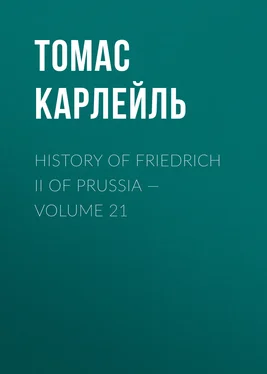Томас Карлейль - History of Friedrich II of Prussia — Volume 21
Здесь есть возможность читать онлайн «Томас Карлейль - History of Friedrich II of Prussia — Volume 21» — ознакомительный отрывок электронной книги совершенно бесплатно, а после прочтения отрывка купить полную версию. В некоторых случаях можно слушать аудио, скачать через торрент в формате fb2 и присутствует краткое содержание. Жанр: foreign_prose, История, literature_19, foreign_edu, foreign_antique, на английском языке. Описание произведения, (предисловие) а так же отзывы посетителей доступны на портале библиотеки ЛибКат.
- Название:History of Friedrich II of Prussia — Volume 21
- Автор:
- Жанр:
- Год:неизвестен
- ISBN:нет данных
- Рейтинг книги:3 / 5. Голосов: 1
-
Избранное:Добавить в избранное
- Отзывы:
-
Ваша оценка:
- 60
- 1
- 2
- 3
- 4
- 5
History of Friedrich II of Prussia — Volume 21: краткое содержание, описание и аннотация
Предлагаем к чтению аннотацию, описание, краткое содержание или предисловие (зависит от того, что написал сам автор книги «History of Friedrich II of Prussia — Volume 21»). Если вы не нашли необходимую информацию о книге — напишите в комментариях, мы постараемся отыскать её.
History of Friedrich II of Prussia — Volume 21 — читать онлайн ознакомительный отрывок
Ниже представлен текст книги, разбитый по страницам. Система сохранения места последней прочитанной страницы, позволяет с удобством читать онлайн бесплатно книгу «History of Friedrich II of Prussia — Volume 21», без необходимости каждый раз заново искать на чём Вы остановились. Поставьте закладку, и сможете в любой момент перейти на страницу, на которой закончили чтение.
Интервал:
Закладка:
We will now give our Second Anecdote; which has less of memorability to us strangers at present, though doubtless it was then, in Berlin society, the more celebrated of the two; relating, as it did, to a high Court-Lady, almost the highest, and who was herself only too celebrated in those years. The heroine is Princess Elizabeth of Brunswick, King's own Niece and a pretty woman; who for four years (14th July, 1765-18th April, 1769) of her long life was Princess Royal of Prussia,—Wife of that tall young Gentleman whom we used to see dancing about, whom we last saw at Schweidnitz getting flung from his horse, on the day of Pirch's saddle there:—his Wife for four years, but in the fourth year ceased to be so [Rodenbeck, ii. 241, 257.] (for excellent reasons, on both sides), and lived thenceforth in a divorced eclipsed state at Stettin, where is laid the scene of our Anecdote. I understand it to be perfectly true; but cannot ascertain from any of the witnesses in what year the thing happened; or whether it was at Stettin or Berlin,—though my author has guessed, "Stettin, in the Lady's divorced state," as appears.
"This Princess had commissioned, direct from Lyon, a very beautiful dress; which arrived duly, addressed to her at Stettin. As this kind of stuffs is charged with very heavy dues, the DOUANIER, head Custom-house Personage of the Town, had the impertinence to detain the dress till payment were made. The Princess, in a lofty indignation, sent word to this person, To bring the dress instantly, and she would pay the dues on it. He obeyed: but,"—mark the result,—"scarcely had the Princess got eye on him, when she seized her Lyon Dress; and, giving the Douanier a couple of good slaps on the face, ordered him out of her apartment and house.
"The Douanier, thinking himself one and somewhat, withdrew in high choler; had a long PROCES-VERBAL of the thing drawn out; and sent it to the King with eloquent complaint, 'That he had been dishonored in doing the function appointed him.' Friedrich replied as follows: TO THE DOUANIER AT STETTIN: 'The loss of the Excise-dues shall fall to my score; the Dress shall remain with the Princess; the slaps to him who has received them. As to the pretended Dishonor, I entirely relieve the complainant from that: never can the appliance of a beautiful hand dishonor the face of an Officer of Customs.—F.'" [Laveaux (abridged), iii. 229.]
Northern Tourists, Wraxall and others, passing that way, speak of this Princess, down to recent times, as a phenomenon of the place. Apparently a high and peremptory kind of Lady, disdaining to be bowed too low by her disgraces. She survived all her generation, and the next and the next, and indeed into our own. Died 18th February, 1840: at the age of ninety-six. Threescore and eleven years of that eclipsed Stettin Existence; this of the Lyon gown, and caitiff of a Custom-houser slapped on the face, her one adventure put on record for us!—
She was signally blamable in that of the Divorce; but not she alone, nor first of the Two. Her Crown-Prince, Friedrich Wilhelm, called afterwards, as King, "DER DICKE (the Fat, or the Big)," and held in little esteem by Posterity,—a headlong, rather dark and physical kind of creature, though not ill-meaning or dishonest,—was himself a dreadful sinner in that department of things; and had BEGUN the bad game against his poor Cousin and Spouse! Readers of discursive turn are perhaps acquainted with a certain "Grafin von Lichtenau," and her MEMOIRS so called:—not willingly, but driven, I fish up one specimen, and one only, from that record of human puddles and perversities:—
"From the first year of our attachment," says this precious Grafin, "I was already the confidant of his," the Prince of Prussia's, "most secret thoughts. One day [in 1767, second year of his married life, I then fifteen, slim Daughter of a Player on the French Horn, in his Majesty's pay], the Prince happened to be very serious; and was owning to me with frankness that he had some wrongs towards my sex to reproach himself with,"—alas, yes, some few:—"and he swore that he would never forsake ME; and that if Heaven disposed of my life before his, none but he should close my eyes. He was fingering with a penknife at the time; he struck the point of it into the palm of his left hand, and wrote with his blood [the unclean creature], on a little bit of paper, the Oath which his lips had just pronounced in so solemn a tone. Vainly should I undertake to paint my emotion on this action of his! The Prince saw what I felt; and took advantage of it to beg that I would follow his example. I hastened to satisfy him; and traced, as he had done, with my blood, the promise to remain his friend to the tomb, and never to forsake him. This Promise must have been found among his Papers after his death [still in the Archives? we will hope not!]—Both of us stood faithful to this Oath. The tie of love, it is true, we broke: but that was by mutual consent, and the better to fix ourselves in the bonds of an inviolable friendship. Other mistresses reigned over his senses; but I"—ACH GOTT, no more of that. [ Memoires de la Comtesse de Lichtenau (a Londres, chez Colburn Libraire, Conduit-street, Bond-street, 2 tomes, small 8vo, 1809), i. 129.]
The King's own account of the affair is sufficiently explicit. His words are: "Not long ago [about two years before this of the penknife] we mentioned the Prince of Prussia's marriage with Elizabeth of Brunswick [his Cousin twice over, her Mother, Princess Charlotte of Prussia, being his Father's Sister and mine, and her Father HIS Mother's Brother,—if you like to count it]. This engagement, from which everybody had expected happy consequences, did not correspond to the wishes of the Royal House." Only one Princess could be realized (subsequently Wife to the late Duke of York),—she came this same year of the penknife,—and bad outlooks for more. "The Husband, young and dissolute (SANS MOEURS), given up to a crapulous life, from which his relatives could not correct him, was continually committing infidelities to his Wife. The Princess, who was in the flower of her beauty, felt outraged by such neglect of her charms; her vivacity, and the good opinion she had of herself, brought her upon the thought of avenging her wrongs by retaliation. Speedily she gave in to excesses, scarcely inferior to those of her Husband. Family quarrels broke out, and were soon publicly known. The antipathy that ensued took away all hope of succession [had it been desirable in these sad circumstances!]. Prince Henri [JUNIOR, this hopeful Prince of Prussia's Brother], who was gifted with all the qualities to be wished in a young man [witness my tears for him], had been carried off by small-pox. ["26th May, 1767," age 19 gone; ELOGE of him by Friedrich ("MS. still stained with tears"), in OEuvres de Frederic , vii. 37 et seq.] The King's Brothers, Princes Henri and Ferdinand, avowed frankly that they would never consent to have, by some accidental bastard, their rights of succession to the crown carried off. In the end, there was nothing for it but proceeding to a divorce." [ OEuvres de Frederic, vi. 23.]
Divorce was done in a beautiful private manner; case tried with strictly shut doors; all the five judges under oath to carry into the grave whatever they came to know of it: [Preuss, iv. 180-186.] divorce completed 18th April, 1769; and, within three months, a new marriage was accomplished, Princess Frederika Luisa of Hessen-Darmstadt the happy woman. By means of whom there was duly realized a Friedrich Wilhelm, who became "King Friedrich Wilhelm III." (a much-enduring, excellent, though inarticulate man), as well as various other Princes and Princesses, in spite of interruptions from the Lichtenau Sisterhood. High-souled Elizabeth was relegated to Stettin; her amount of Pension is not mentioned; her Family, after the unhappy proofs communicated to them, had given their consent and sanction;—and she stayed there, idle, or her own mistress of work, for the next seventy-one years.—Enough of HER Lyon Dress, surely, and of the Excise system altogether!—
Читать дальшеИнтервал:
Закладка:
Похожие книги на «History of Friedrich II of Prussia — Volume 21»
Представляем Вашему вниманию похожие книги на «History of Friedrich II of Prussia — Volume 21» списком для выбора. Мы отобрали схожую по названию и смыслу литературу в надежде предоставить читателям больше вариантов отыскать новые, интересные, ещё непрочитанные произведения.
Обсуждение, отзывы о книге «History of Friedrich II of Prussia — Volume 21» и просто собственные мнения читателей. Оставьте ваши комментарии, напишите, что Вы думаете о произведении, его смысле или главных героях. Укажите что конкретно понравилось, а что нет, и почему Вы так считаете.









